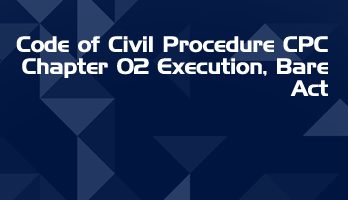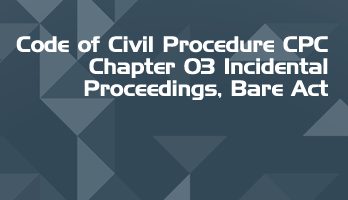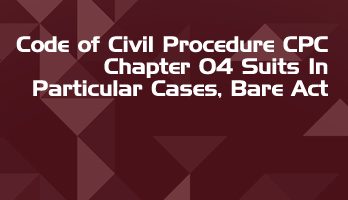A 'Bare act' is the actual legislation passed by the Parliament of India. Generally, an act sets out the high level legal and policy principles applicable to the subject matter of the law.
Most acts are accompanied by 'subsidiary legislation' such as rules, regulations, notifications and orders; which address the actual implementation detail of the act.
Free Full Course Available on LawMint's YouTube Channel
How to Land Your Dream LLB Internship in a Top Law Firm
- Part 1 - Introduction
- Part 2 - Internship Planning
- Part 3 - Internship Research
- Part 4 - Building Your Profile
- Part 5 - The Email
- Part 6 - The Resume
- Part 7 - The Cover Letter
- Part 8 - The Interview
- Part 9 - Self Development
Practical and comprehensive course, with real examples and step-by-step analysis of the complete internship application process. Check out LawMint's YouTube channel now!
Negotiable Instruments Act, 1881
Chapter VIII – Of Notice of Dishonour
Section 91 – Dishonour by non – acceptance
A bill of exchange is said to be dishonoured by non – acceptance when the drawee, or one of several drawees not being partners, makes default in acceptance upon being duly required to accept the bill, or where presentment is excused and the bill is not accepted. Where the drawee is incompetent to contract, or the acceptance is qualified, the bill may be treated as dishonoured.
Section 92 – Dishonour by non – payment
A promissory note, bill of exchange or cheque is said to be dishonoured by non – payment when the maker of the note, acceptor of the bill or drawee of the cheque makes default in payment upon being duly required to pay the same.
Section 93 – By and to whom notice should be given
When a promissory note, bill of exchange or cheque is dishonoured by non – acceptance or non – payment, the holder thereof, or some party thereto who remains liable thereon, must give notice that the instrument has been so dishonoured to all other parties whom the holder seeks to make severally liable thereon, and to some one of several parties whom he seeks to make jointly liable thereon. Nothing in this section renders it necessary to give notice to the maker of the dishonoured promissory note or the drawee or acceptor of the dishonoured bill of exchange or cheque.
Section 94 – Mode in which notice may be given
Notice of dishonour may be given to a duly authorized agent of the person to whom it is required to be given, or, where he has died, to his legal representative, or, where he has been declared an insolvent, to his assignee; may be oral or written; may, if written, be sent by post; and may be in any form; but it must inform the party to whom it is given, either in express terms or by reasonable intendment, that the instrument has been dishonoured, and in what way, and that he Will be held liable thereon; and it must be given within a reasonable time after dishonour, at the place of business or (in case such party has no place of business) at the residence of the party for whom it is intended. If the notice is duly directed and sent by post and miscarries, such miscarriage does not render the notice invalid.
Section 95 – Party receiving must transmit notice of dishonour
Any party receiving notice of dishonour must, in order to render any prior party liable to himself, give notice of dishonour to such party within a reasonable time, unless such party otherwise receives due notice as provided by section 93.
Section 96 – Agent for presentment
When the instrument is deposited with an agent for presentment, the agent is entitled to the same time to give notice to his principal as if he were the holder giving notice of dishonour, and the principal is entitled to a further like period to give notice of dishonour.
Section 97 – When party to whom notice given is dead
When the party to whom notice of dishonour is despatched is dead, but the party despatching the notice is ignorant of his death the notice is sufficient.
Section 98 – When notice of dishonour is unnecessary
No notice of dishonour is necessary:
- when it is dispensed with by the party entitled thereto;
- in order to charge the drawer when he has countermanded payment;
- when the party charged could not suffer damage for want of notice;
- when the party entitled to notice cannot after due search be found; or the party bound to give notice is, for any other reason, unable without any fault of his own to give it;
- to charge the drawers, when the acceptor is also a drawer;
- in the case of a promissory note which is not negotiable;
- when the party entitled to notice, knowing the facts, promises unconditionally to pay the amount due on the instrument.
Important Central Acts in Regional Languages
Legislative department website also features regional language versions of several important Central Acts.
Free Full Course Available on LawMint's YouTube Channel
How to Land Your Dream LLB Internship in a Top Law Firm
- Part 1 - Introduction
- Part 2 - Internship Planning
- Part 3 - Internship Research
- Part 4 - Building Your Profile
- Part 5 - The Email
- Part 6 - The Resume
- Part 7 - The Cover Letter
- Part 8 - The Interview
- Part 9 - Self Development
Practical and comprehensive course, with real examples and step-by-step analysis of the complete internship application process. Check out LawMint's YouTube channel now!












